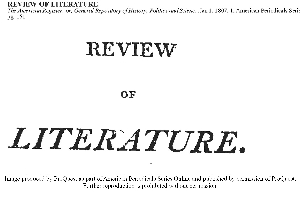 ―151― ―151―
REVIEW
OF
LITERATURE.
 ―152― ―152―
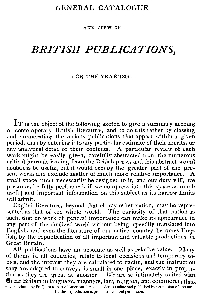 ―153― ―153―
GENERAL CATALOGUE
and view of
BRITISH PUBLICATIONS,
FOR THE YEAR 1806.
IT is the object of the following sketch to give a summary account
of contemporary British literature, and to do this rather by classing
and enumerating the various publications that appear within a given
period, than by entering into any particular estimate of their merits, or
any analytical detail of their contents. A particular review of each
work might be easily given, carefully abstracted from the numerous
critical journals issuing from the British press, and this abstract would
doubtless be useful, but it would occupy the greater part of the pre-
sent work, and exclude matter of much more relative importance. A
small space must necessarily be assigned to it, and our duty will, we
presume, be fully performed, if we compress into this space as much
useful and important information on this subject as its narrow limits
will admit.
English literature, beyond that of any other nation, may be repre-
sented as that of the whole world. The curiosity of that nation is
such, that no work of general importance can make its appearance in
any part of the civilized world without being speedily translated into
English, and even the literature of our native country becomes Eng-
lish, by the republication of all important and valuable productions in
Great Britain.
All publications have an absolute as well as relative value. Many
of them, in all countries, relate to local occasions and temporary to-
pics, and the interest they are calculated to excite, and the instruction
they are adapted to convey, is small in one place, exactly in propor-
tion as they are great at another. We are so intimately united with
Great Britain in language, manners, law, religion, and commerce, that,
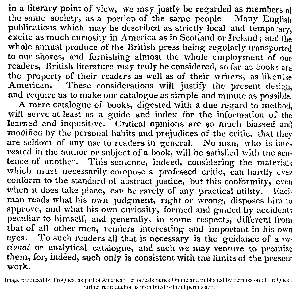 ―154a― ―154a―
in a literary point of view, we may justly be regarded as members of
the same society, as a portion of the same people. Many English
publications which may be described as strictly local and temporary,
excite as much curiosity in America as in Scotland or Ireland; and the
whole annual produce of the British press being regularly transported
to our shores, and furnishing almost the whole employment of our
readers, British literature may truly be considered, so far as books are
the property of their readers as well as of their writers, as likewise
American. These considerations will justify the present design,
and require us to make our catalogue as simple and minute as possible.
A mere catalogue of books, digested with a due regard to method,
will serve at least as a guide and index for the information of the
learned and inquisitive. Critical opinions are so much biassed and
modified by the personal habits and prejudices of the critic, that they
are seldom of any use to readers in general. No man, who is inte-
rested in the author or subject of a book, will be satisfied with the sen-
tence of another. This sentence, indeed, considering the materials
which must necessarily compose a professed critic, can hardly ever
conform to the standard of abstract justice, but this conformity, even
when it does take place, can be rarely of any practical utility. Each
man reads what his own judgment, right or wrong, disposes him to
approve, and what his own curiosity, formed and guided by accidents
peculiar to himself, and generally, in some respects, different from
that of all other men, renders interesting and important in his own
eyes. To such readers all that is necessary is the guidance of a ra-
tional or analytical catalogue, and such we may venture to promise
them, for, indeed, such only is consistent with the limits of the present
work.
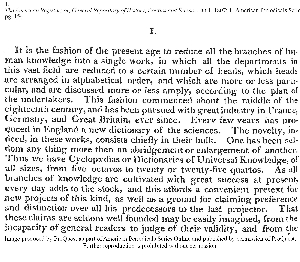 ―154b― ―154b―
I.
It is the fashion of the present age to reduce all the branches of hu-
man knowledge into a single work, in which all the departments in
this vast field are reduced to a certain number of heads, which heads
are arranged in alphabetical order, and which are more or less parti-
cular, and are discussed more or less amply, according to the plan of
the undertakers. This fashion commenced about the middle of the
eighteenth century, and has been pursued with great industry in France,
Germany, and Great Britain, ever since. Every few years has pro-
duced in England a new dictionary of the sciences. The novelty, in-
deed, in these works, consists chiefly in their bulk. One has been sel-
dom any thing more than an abridgement or enlargement of another.
Thus we have Cyclopaedias or Dictionaries of Universal Knowledge, of
all sizes, from five octavos to twenty or twenty-five quartos. As all
branches of knowledge are cultivated with great success at present,
every day adds to the stock, and this affords a convenient pretext for
new projects of this kind, as well as a ground for claiming preference
and distinction over all his predecessors to the last projector. That
these claims are seldom well founded may be easily imagined, from the
incapacity of general readers to judge of their validity, and from the
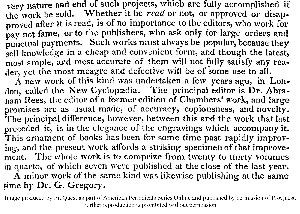 ―155a― ―155a―
very nature and end of such projects, which are fully accomplished if
the work be sold. Whether it be read or not, or approved or disap-
proved after it is read, is of no importance to the editors, who work for
pay not fame, or to the publishers, who ask only for large orders and
punctual payments. Such works must always be popular, because they
sell knowledge in a cheap and convenient form, and though the latest,
most ample, and most accurate of them will not fully satisfy any rea-
der, yet the most meagre and defective will be of some use to all.
A new work of this kind was undertaken a few years ago, in Lon-
don, called the New Cyclopaedia. The principal editor is Dr. Abra-
ham Rees, the editor of a former edition of Chambers' work, and large
promises are as usual made, of accuracy, copiousness, and novelty.
The principal difference, however, between this and the work that last
preceded it, is in the elegance of the engravings which accompany it.
This ornament of books has been for some time past rapidly improv-
ing, and the present work affords a striking specimen of that improve-
ment. The whole work is to comprize from twenty to thirty volumes
in quarto, of which seven were published at the close of the last year.
A minor work of the same kind was likewise publishing at the same
time by Dr. G. Gregory.
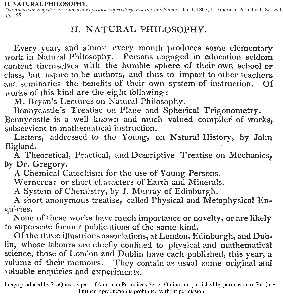 ―155b― ―155b―
II.NATURAL PHILOSOPHY.
Every year, and almost every month produces some elementary
work in Natural Philosophy. Persons engaged in education seldom
content themselves with the humble sphere of their own school or
class, but aspire to be authors, and thus to impart to other teachers
and seminaries the benefits of their own system of instruction. Of
works of this kind are the eight following:
M. Bryan's Lectures on Natural Philosophy.
Bonnycastle's Treatise on Plane and Spherical Trigonometry.
Bonnycastle is a well known and much valued compiler of works,
subservient to mathematical instruction.
Letters, addressed to the Young, on Natural History, by John
Bigland.
A Theoretical, Practical, and Descriptive Treatise on Mechanics,
by Dr. Gregory.
A Chemical Catechism for the use of Young Persons.
Wernerea: or short characters of Earth and Minerals.
A System of Chemistry, by J. Murray of Edinburgh.
A short anonymous treatise, called Physical and Metaphysical En-
quiries.
None of these works have much importance or novelty, or are likely
to supersede former publications of the same kind.
Of the three illustrious associations, at London, Edinburgh, and Dub-
lin, whose labours are chiefly confined to physical and mathematical
science, those of London and Dublin have each published, this year, a
volume of their memoirs. They contain as usual some original and
valuable enquiries and experiments.
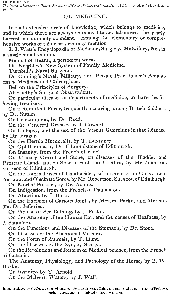 ―156― ―156―
III. MEDICINE.
In that extensive circle of knowledge, which belongs to medicine,
and in which there are always so many literary labourers, the yearly
harvest is commonly abundant. Among the elementary or compre-
hensive works of this class, we may mention
J. J. Watt's Encyclopaedia of Medicine, Surgery, Midwifery, &c., in
a single small volume.
Manual of Health, a periodical work.
Dr. Keighley's New System of Family Medicine.
Turnbull's Naval Surgeon.
Dr. Cuming's Naval, Military, and Private Practitioner's Amanu-
ensis, Medicus, and Chirurgicus.
Bell on the Principles of Surgery.
Abernethy's Surgical Observations.
On particular diseases or departments of medicine, we have the fol-
lowing treatises:
On a Remittent Fever, frequently occuring among British Soldiers,
by Dr. Sutton.
On Consumption, by Dr. Reed.
On the Venereal Disease, by J. Howard.
On Epilepsy, and the use of the Viscus Guercinus in that Disease,
by Dr. Frazer.
On the Hernia Humoralis, by T. Luxmore.
On Ophthalmia, by Dr. Edmundstone of Edinburgh.
On Insanity, from the French of Rinel.
On Urinary Gravel and Stone, on diseases of the Bladder and
Prostate Gland, and on Strictures of the Urethra, by Mr. Johnston,
surgeon of Edinburgh.
On the Internal uses of Cantharides, with remarks on Gleet, Leu-
corrhaea, and Obstinate Sores, by Mr. Robertson, Surgeon of Edinburgh.
On Morbid Poisons, by Dr. Adams.
On Indigestion, from the French of Daubenton.
On Abortion, by J. Burn.
On the Excision of Carious Joints, by Messrs. Parke, and Moreau,
and Dr. Jefferies.
On the use of Sea Bathing, by J. Peake.
On the Anatomy of the Human Ear, and the causes of Deafness, by
J. Saunders.
On the Functions and Diseases of the Stomach, by Dr. Stone.
On Diseases of the Abdominal Viscera.
On the Form of Animals, by T. Hunt.
On the Diseases of the Eye, by Scarpa.
On the Revolutions and Reform of Medical Science, from the French
of Gabanis.
The Anatomy, Physiology, and Pathology of the Horse, by B. W.
Burke.
On Insanity, by T. Arnold.
On the Malvern Waters, by J. Wall.
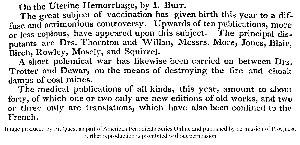 ―157a― ―157a―
On the Uterine Hemorrhage, by I. Burr.
The great subject of vaccination has given birth this year to a dif-
fuse and acrimonious controversy. Upwards of ten publications, more
or less copious, have appeared upon this subject. The principal dis-
putants are Drs. Thornton and Willan, Messrs. More, Jones, Blair,
Birch, Rowley, Mosely, and Squirrel.
A short polemical war has likewise been carried on between Drs.
Trotter and Dewar, on the means of destroying the fire and choak
damps of coal mines.
The medical publications of all kinds, this year, amount to about
forty, of which one or two only are new editions of old works, and two
or three only are translations, which have also been confined to the
French.
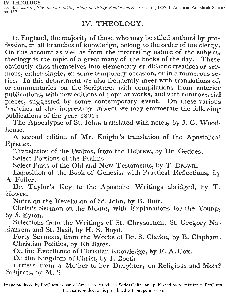 ―157b― ―157b―
IV. THEOLOGY.
In England, the majority of those who may be stiled authors by pro-
fession, in all branches of knowledge, belong to the order of the clergy-
On this account as well as from the interesting nature of the subject,
theology is the topic of a great many of the books of the day. These
obviously class themselves into elementary or didactic treatises or ser-
mons, either single, on some temporary occasion, or in a numerous se-
ries. In this department we also frequently meet with translations of,
or commentaries on the Scripture, with compilations from anterior
publications, with new editions of popular works, and with controversial
pieces, suggested by some contemporary event. On these various
branches of this interesting subject we may enumerate the following
publications of the year 1806:
The Apocalypse of St. John, translated with notes, by J. C. Wood-
house.
A second edition of Mr. Knight's translation of the Apostolical
Epistles.
Translation of the Psalms, from the Hebrew, by Dr. Geddes.
Select Portions of the Psalms.
Select Parts of the Old and New Testaments, by T. Brown.
Exposition of the Book of Genesis, with Practical Reflections, by
A. Fuller.
Dr. Taylor's Key to the Apostolic Writings abridged, by T.
Howes.
Notes on the Revelation of St. John, by B. Butt.
Christ's Sermon on the Mount, with Explanations for the Young,
by J. Eyton.
Selections from the Writings of St. Chrysostom, St. Gregory Na-
zianzen, and St. Basil, by H. S. Boyd.
Forty Sermons, from the Works of Dr. S. Clarke, by B. Clapham.
Christian Politics, by Eli Bates.
On the Excellence of Christian Knowledge, by F. A. Cox.
On the Kingdom of Christ, by J. Booth.
Letters from a Mother to her Daughter, on Religious and Moral
Subjects, by M. S.
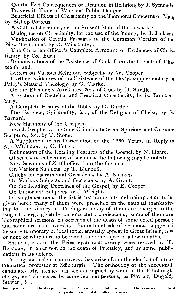 ―158― ―158―
On the Evil Consequences of Disunion in Religion, by J. Symonds.
Prayers in Time of War and Public Danger.
Beneficial Effects of Christianity on the Temporal Concerns of Man,
by Bishop Porteus.
A Call to Christians, on the Present State of the Jews, &c.
Dialogues on Christianity, for the use of the Young, by J. Jackson.
Vindication of Certain Passages in the Common Version of the
New Testament, by C. Winstanley.
The Christian Officer's Complete Armour: or Evidences of Chris-
tianity, by Col. Burn.
Demonstrations of the Existence of God, from the French of Cha-
teaubriand.
Letters on Various Religious Subjects, by W. Cooper.
Further Evidences of the Existence of the Deity, supplementary to
Paley's Natural Theology, by G. Clarke.
On the Existence, Attributes, &c., of God, by D. Saville.
A System of Doctrinal and Practical Christianity, by E. Bracken-
bury.
A Complete History of the Bible, by G. Burder.
The Essence, Spirituality, &c., of the Religion of Christ, by S.
Barnard.
New Harmony of the Gospels.
Jewish Prophecy, the Sole Criterion between Spurious and Genuine
Scripture, &c., by T. Stone.
A Supplement to his Dissertation on the 1260 Years, in Reply to
Mr. Whitaker, by G. Faber.
Delineation of the Leading Features of the Gospel, by N. Hoare.
Of series, or collections of sermons, the following may be noted:
New Sermons of Zallihoffer, from the German.
On Various Subjects, by T. Blundell.
Chiefly on Sacramental Occasions, by A. Shanks.
On Various Subjects and Occasions, by A. Grant.
On the Leading Doctrines of the Gospel, by E. Cooper.
On Important Subjects, by J. Wright.
Of single sermons, the list is too numerous and unimportant to be
given here: many of them were preached on the national thanksgiv-
ing for the victory of Trafalgar; many of them are charges to the
English clergy given by bishops and arch-deacons; some of them are
biographical sermons, on occasion of the death of some noted person;
and some are controversial. Some hundreds of sermons, suggested
by some temporary or local topic, annually appear in Great Britain, few
or none of which are to be found after the lapse of a few months.
Some sparks of the Priestleyan controversy were revived by T.
Belsham, in a sermon on the death of Priestley, and by some publi-
cations in its defence.
A long and ardent controversy has arisen from the election of a ma-
thematical professor at Edinburgh. The orthodoxy of the successful
candidate, Mr. Leslie, has been arraigned by some of the Edinburgh
clergy, and vindicated by some learned persons, as Playfair, Dugald,
Stewart, &c.
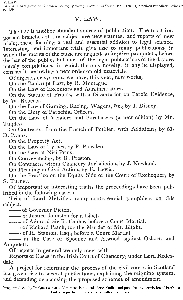 ―159― ―159―
V. LAW.
The law is another abundant source of publication. The most im-
portant branches of this subject are new statutes, and reports of new
trials;, these forming a real and essential addition to legal science.
Interesting and important trials give rise to many publications, in
which the merits of the cause are argued, in fugitive pamphlets, before
the bar of the public, but most of the legal publications of the day are
merely compilations, in which the only novelty, if any be displayed,
consists in bestowing a new order on old materials.
Of digests, or systems, we have, this year, new works,
On the Bankrupt Law, by B. Montague.
On the Law of Executors and Administrators.
On the Statute of Frauds, with a Dissertation on Parole Evidence,
by W. Roberts.
On the Law of Gaming, Racing, Wagers, &c., by J. Disney.
On the Duty of Parochial Officers.
On the Law of Venders and Purchasers (a new edition) by Mr.
Tugden.
On Contracts, from the French of Pothier, with Additions, by M.
D. Evans.
On the Property Act.
On the Law of Tythes, by F. Plowden.
On the Law at Nisi Prius.
On Conveyancing, by R. Preston.
On Contracts, within Chancery Jurisdiction, by J. Newland.
On Pleading in Civil Action, by E. Lewis.
On the Practice on the Equity Side of the Court of Exchequer, by
S. Turner.
Of important or interesting trials, the proceedings have been pub-
lished in the following cases:
Trial of Lord Melville: many controversial pamphlets on this
subject.
——of Governor Picton.
——of Justice Johnston for a Libel.
——of Admiral Sir R. Calder, before a Court Martial.
——of Richard Patch, for the Murder of Mr. Blight.
——of H. Stanton, Esq., before a Court Martial.
——in the Case of Spooner and Atwood against Osborn and
Amphlett.
Of reports in general we only meet with
Reports of Cases in the Irish Court of Chancery, under Lord Redes-
dale.
A project for reforming the process of the civil courts in Scotland
has given rise to several publications, explaining the reigning system,
and defending or accusing the proposed schemes of amendment.
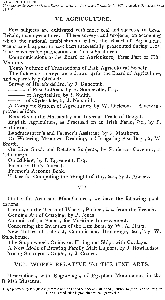 ―160― ―160―
VI. AGRICULTURE.
Few subjects are cultivated with more zeal and success, in Great
Britain, than agriculture. These surveys and projects, on account of
which the national establishment called the Board of Agriculture
was created, appear to have been successfully prosecuted during 1806.
The considerable publications on this subject are:
Communications to the Board of Agriculture, First Part of Fifth
Volume.
Tenth Volume of Transactions of Bath Agricultural Society.
The following surveys were drawn up for the Board of Agriculture,
and separately published:
Survey of Herefordshire, by J. Duncomb.
—of East Lothian, by R. Somerville, Esq.
—of Argyleshire, by J. Smith.
—of Clydesdale, by J. Naismith.
A Complete System of Agriculture, by W. Dickson. A new im-
proved edition.
Remarks on the Husbandry and Internal Trade of Bengal.
English Agriculture, as Practised on an Irish Farm, &c., by R.
Parkinson.
Landmeasurer's and Farmer's Assistant, by J. Matthews.
On Watering Meadows, Draining, and Irrigating Peat Bogs, by W.
Smith.
On Live Stock and Relative Subjects, by Professor Coventry, at
Edinburgh.
On Mildew, by I. Egremont, Esq.
Farmer's Daily Journal.
Farmer's Account Book.
Tables for Computing the Weight of Hay, &c., by J. Ainsley.
VII.
On Useful Arts and Manufactures, we have the following publi-
cations.
Camus, on the Teeth of Wheels, Pinions, &c., from the French.
Genuine Art of Guaging, by P. Jones.
Memoirs of the Society for Maritime Improvement.
Concerning the Invention of the Life Boat, by W. A. Haits.
New Tables of Interest, Commission, Brokerage, &c., by W.
Stonehouse.
The Ship-owner's Guide, on Fitting out Ships with Cordage.
A New Mode of Brewing Family Malt Liquors, by J. Rowlandson.
Young Surveyor's Guide, by J. Coates.
VIII. WORKS RELATIVE TO THE FINE ARTS.
Descriptions, with Engravings, of Egyptian Monuments, in the
British Museum.
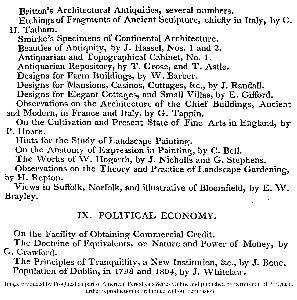 ―161a― ―161a―
Britton's Architectural Antiquities, several numbers.
Etchings of Fragments of Ancient Sculpture, chiefly in Italy, by C.
H. Tatham.
Smirke's Specimens of Continental Architecture.
Beauties of Antiquity, by J. Hassel, Nos. 1 and 2.
Antiquarian and Topographical Cabinet, No. 1.
Antiquarian Repository, by T. Grose, and T. Astle.
Designs for Farm Buildings, by W. Barber.
Designs for Mansions, Casinos, Cottages, &c., by J. Randall.
Designs for Elegant Cottages, and Small Villas, by E. Gifford.
Observations on the Architecture of the Chief Buildings, Ancient
and Modern, in France and Italy, by G. Tappin.
On the Cultivation and Present State of Fine Arts in England, by
P. Hoare.
Hints for the Study of Landscape Painting.
On the Anatomy of Expression in Painting, by C. Bell.
The Works of W. Hogarth, by J. Nicholls and G. Stephens.
Observations on the Theory and Practice of Landscape Gardening,
by H. Repton.
Views in Suffolk, Norfolk, and illustrative of Bloomfield, by E. W.
Brayley.
IX. POLITICAL ECONOMY.
On the Facility of Obtaining Commercial Credit.
The Doctrine of Equivalents, or Nature and Power of Money, by
G. Crawford.
The Principles of Tranquillity, a New Institution, &c., by J. Bone.
Population of Dublin, in 1798 and 1804, by J. Whitelaw.
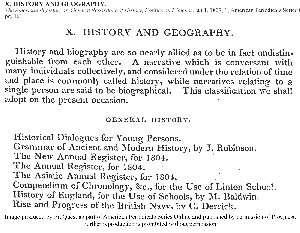 ―161b― ―161b―
X. HISTORY AND GEOGRAPHY.
History and biography are so nearly allied as to be in fact undistin-
guishable from each other. A narrative which is conversant with
many individuals collectively, and considered under the relation of time
and place is commonly called history, while narratives relating to a
single person are said to be biographical. This classification we shall
adopt on the present occasion.
GENERAL HISTORY.
Historical Dialogues for Young Persons.
Grammar of Ancient and Modern History, by J. Robinson.
The New Annual Register, for 1804.
The Annual Register, for 1804.
The Asiatic Annual Register, for 1804.
Compendium of Chronology, &c., for the Use of Linton School.
History of England, for the Use of Schools, by M. Baldwin.
Rise and Progress of the British Navy, by C. Derrick.
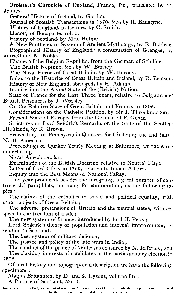 ―162― ―162―
Froissart's Chronicle of England, France, &c., translated by T.
Johnes.
General History of Ireland, by Gordon.
Journal of Scottish Transactions in 1570, &c., by R. Banatyne.
History of England, in Letters, by C. Smith.
History of Bonaparte, vol. 1.
History of Scotland, by Mrs. Helme.
A New Pantheon, or System of Ancient Mythology, by E. Baldwin.
Biographical History of England: a continuation of Granger, by
himself and M. Noble.
History of the Belgian Republic, from the German of Schiller.
The British Neptune, &c., by W. Burney.
The Naval Heroes of Great Britain, by W. Burney.
Index to the Histories of Great Britain and Ireland, by R. Beatson.
History of New England, abridged, by H. Adams.
Inquiry into the Actual State of the (British) Nation.
State of France for the Last Three Years, relative to Belgium and
British Prisoners, by J. Worsley.
On the Relative State of Great Britain and France, in 1806.
Considerations on the Catholic Petition, by Sir J. Throckmorton.
Present State of Europe, from the German of F. Gentz.
Strictures on Lord Selkirk's Remarks on the State of the Scottish
Highlands, by R. Brown.
Proceedings of Pennsylvania Quakers for Civilizing the Indians
North America.
Proceedings of Quaker Yearly Meeting at Baltimore, on the same
undertaking.
Naval Anecdotes, &c.
Examination of the British Doctrine relative to Neutral Flags.
Letter of Lord Clive, in 1769, relative to Indian Affairs.
Inquiry into the Best Means of National Safety.
This year produced, besides the foregoing, a great number of con-
troversial pamphlets, too many for enumeration, on the following to-
pics:
The claims of the catholics to social and political equality, with
other subjects of Great Britain;
The adverse pretensions of Britain and the neutral states, with re-
spect to the freedom of trade;
The new system of finance, introduced by lord H. Petty;
Lord Selkirk's theory of population and internal improvement, in
relation to Scotland;
The best system of military defence;
The justice and policy of the late wars in India;
The conduct of the prince of Wales, as censured by N. Jefferies; and
The clashing interests of candidates at the parliamentary election in
1806.
Of local history and topographical description we have the following
specimens:
Magna Britannica, by D. and S. Lysons, volume first.
A Picture of Scotland, No. 1.
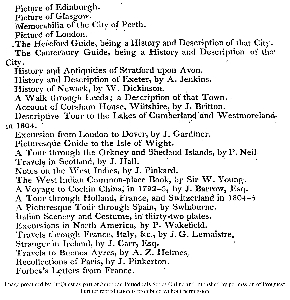 ―163a― ―163a―
Picture of Edinburgh.
Picture of Glasgow.
Memorabilia of the City of Perth.
Picture of London.
The Hereford Guide, being a History and Description of that City.
The Canterbury Guide, being a History and Description of that
City.
History and Antiquities of Stratford upon Avon.
History and Description of Exeter, by A. Jenkins.
History of Newark, by W. Dickinson.
A Walk through Leeds; a Description of that Town.
Account of Corsham House, Wiltshire, by J. Britton.
Descriptive Tour to the Lakes of Cumberland and Westmoreland,
in 1804.
Excursion from London to Dover, by J. Gardiner.
Picturesque Guide to the Isle of Wight.
A Tour through the Orkney and Shetland Islands, by P. Neil.
Travels in Scotland, by J. Hall.
Notes on the West Indies, by J. Pinkard.
The West Indian Common-place Book, by Sir W. Young.
A Voyage to Cochin China, in 1792-3, by J. Barrow, Esq.
A Tour through Holland, France, and Switzerland in 1804-5
A Picturesque Tour through Spain, by Swinburne.
Italian Scenery and Costume, in thirty-two plates.
Excursions in North America, by P. Wakefield.
Travels through France, Italy, &c., by J. G. Lemaistre,
Stranger in Ireland, by J. Carr, Esq.
Travels to Buenos Ayres, by A. Z. Helmes.
Recollections of Paris, by J. Pinkerton.
Forbes's Letters from France.
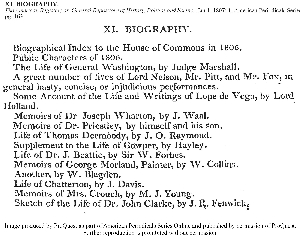 ―163b― ―163b―
XI. BIOGRAPHY.
Biographical Index to the House of Commons in 1806.
Public Characters of 1806.
The Life of General Washington, by Judge Marshall.
A great number of lives of Lord Nelson, Mr. Pitt, and Mr. Fox, in
general hasty, concise, or injudicious performances.
Some Account of the Life and Writings of Lope de Vega, by Lord
Holland.
Memoirs of Dr Joseph Wharton, by J. Waal.
Memoirs of Dr. Priestley, by himself and his son.
Life of Thomas Dermoody, by J. O. Raymond.
Supplement to the Life of Cowper, by Hayley.
Life of Dr. J. Beattie, by Sir W. Forbes.
Memoirs of George Morland, Painter, by W. Collins.
Another, by W. Blagden.
Life of Chatterton, by J. Davis.
Memoirs of Mrs. Crouch, by M. J. Young.
Sketch of the Life of Dr. John Clarke, by J. R. Fenwick.
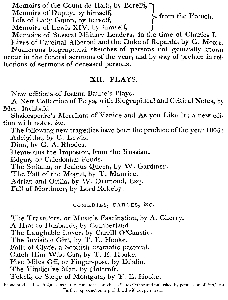 ―164a― ―164a―
| Memoirs of the Count de Hadt, by Borelli, |
from the French. |
| Memoirs of Dupuy, by himself, |
| Life of Lady Guion, by herself, |
| Memoirs of Lewis XIV, by himself, |
Memoirs of Several Military Leaders, in the time of Charles I.
Lives of Cardinal Alberoni and the Duke of Reparda, by G. Moore.
Numerous biographical sketches of persons not generally known
occur in the funeral sermons of the year, and by way of preface in col-
lections of sermons of deceased persons.
XII. PLAYS.
New editions-of Joanna Baillie's Plays.
A New Collection of Plays, with Biographical and Critical Notes, by
Mrs. Inchbald.
Shakespeare's Merchant of Venice and As you Like It; a new edi-
tion with notes, &c.
The following new tragedies have been the produce of the year 1806:
Adelgitha, by G. Lewis.
Dion, by G. A. Rhodes.
Demetrius the Impostor, from the Russian.
Edgar, or Caledonian Feuds.
The Sultana, or Jealous Queen, by W. Gardiner.
The Fall of the Mogul, by T. Maurice.
Adrian and Orilla, by W. Diamond, Esq.
Fall of Mortimer, by Lord Rokeby.
comedies, farces, &c.
The Travellers, or Music's Fascination, by A. Cherry.
A Hint to Husbands, by Cumberland.
The Laughable Lover, by Carrill O'Caustic.
The Invisible Girl, by T. E. Hooke.
Falls of Clyde, a Scottish dramatic pastoral.
Catch Him Who Can, by T. E. Hooke.
Five Miles Off, or Finger-post, by Dibdin.
The Vindictive Man, by Holcroft.
Tekeli, or Siege of Montgatz, by T. E. Hooke.
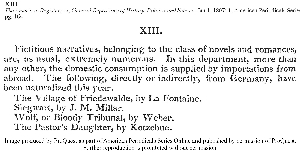 ―164b― ―164b―
XIII.
Fictitious narratives, belonging to the class of novels and romances,
are, as usual, extremely numerous. In this department, more than
any other, the domestic consumption is supplied by importations from
abroad. The following, directly or indirectly, from Germany, have
been naturalized this year.
The Village of Friedewalde, by La Fontaine.
Siegwart, by J. M. Millar.
Wolf, or Bloody Tribunal, by Weber.
The Pastor's Daughter, by Kotzebue.
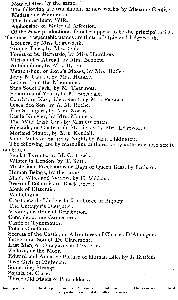 ―165― ―165―
Nouvellettes, by the same.
The following are translations of new works, by Madame Genlis:
Madame de Maintenon.
The Impertinent Wife.
Alphonsine, or Maternal Affection.
Of the home productions, females appear to be the principal artists.
The most respectable names are those of Opie and Edgeworth.
Leonora, by Miss Edgeworth.
Simple Tales, by Mrs. Opie
Forest of St. Bernardo, by Miss Hamilton.
Vicissitudes Abroad, by Mrs. Bennett.
Antidelphine, by Mrs. Byron.
Vensenshon, or Love's Mazes, by Mrs. Butler.
Lady M'Laurin, by Mrs. Hunter.
Letters from the Mountains.
Sans Souci Park, by M. Tharmott.
Panorama of Youth, by M. Sterndale.
Convict, or Navy Lieutenant, by Mrs. Parsons.
Discarded Son, by A. M. Roche.
The Strangers, by Mrs. Norris.
Castle Nuovier, by Mrs. Manners.
The Wild Irish Girl, by Miss Owenson.
Adelaide, or Chateau de St. Pierre, by Mrs. Edgeworth.
Morland Manor, by Mrs. Kendall.
Violet Vale, or Saturday Night, by Mrs. Pilkington.
The following are by masculine authors, or by authors whose sex is
doubtful:
Feudal Tyrants, by M. G. Lewis.
Winter in London, by T. Surr.
Mysterious Freebooter, or Days of Queen Bess, by Latham.
Human Beings, by the same.
Maid, Wife, and Widow, by H. Siddons.
Bravo of Bohemia, or Black Forest.
Monk of Dissentis.
Wilhelmina.
Constance de Lindensdorf, or Force of Bigotry.
The Cottager's Daughter.
Vivinio, or Hour of Retribution.
Conrade, or the Gamesters.
Castle of Tynemouth.
Polish Chieftain.&
Secrets of the Castle, or Adventures of Charles D'Almagne.
Father and Son of De Claremont.
Last Man, or Omegarus and Syderia.
Zofloya, or the Moor.
Edward and Anna, or Picture of Human Life, by J. Bristed.
Two Girls of Eighteen.
Something Strange.
Sophia St. Clare.
Three Old Maids of Penruddock.
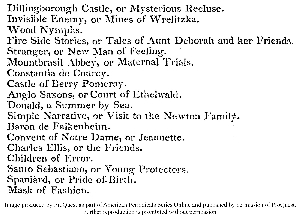 ―166a― ―166a―
Dillingborough Castle, or Mysterious Recluse.
Invisible Enemy, or Mines of Wrelitzka.
Wood Nymphs.
Fire Side Stories, or Tales of Aunt Deborah and her Friends.
Stranger, or New Man of Feeling.
Mountbrasil Abbey, or Maternal Trials.
Constantia de Courcy.
Castle of Berry Pomeray.
Anglo Saxons, or Court of Ethelwald.
Donald, a Summer by Sea.
Simple Narrative, or Visit to the Newton Family.
Baron de Falkenheim.
Convent of Notre Dame, or Jeannette.
Charles Ellis, or the Friends.
Children of Error.
Santo Sebastiano, or Young Protectors.
Spaniard, or Pride of Birth.
Mask of Fashion.
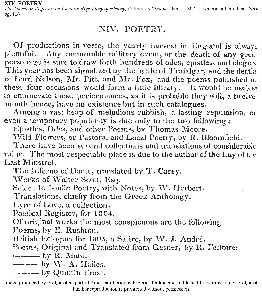 ―166b― ―166b―
XIV. POETRY.
Of productions in verse, the yearly harvest in England is always
plentiful. Any memorable military event, or the death of any great
personage is sure to draw forth hundreds of odes, epistles, and elegies.
This year has been signalized by the battle of Trafalgar, and the deaths
of Lord Nelson, Mr. Pitt, and Mr. Fox, and the poems published on
these four occasions would form a little library. It would be useless
to enumerate these performances, as it is probable they will, a twelve-
month hence, have no existence but in such catalogues.
Among a vast heap of melodious rubbish, a lasting reputation, or
even a temporary popularity is due only to the two following:
Epistles, Odes, and other Poems, by Thomas Moore.
Wild Flowers, or Pastoral and Local Poetry, by R. Bloomfield.
There have been several collections and translations of considerable
value. The most respectable place is due to the author of the Lay of the
Last Minstrel.
The Inferno of Dante, translated by T. Carey.
Works of Walter Scott, Esq.
Select Icelandic Poetry, with Notes, by W. Herbert.
Translations, chiefly from the Greek Anthology.
Lyre of Love, a collection.
Poetical Register, for 1804.
Of original works the most conspicuous are the following
Poems, by E. Rushton.
British Eclogue, for 1805, a Satire, by W. J. Andrè.
Poems, Original and Translated from Gesner, by R. Fellowes.
—— by R. Mant.
—— by W. A. Hailes.
—— by Quintin Frost.
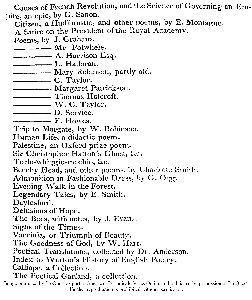 ―167a― ―167a―
Causes of French Revolution, and the Science of Governing an Em-
pire, an epic, by G. Sanon.
Citizen, a Hudibrastic, and other poems, by E. Montague.
A Satire on the President of the Royal Academy.
Poems, by J. Graham.
—— Mr Polwhele.
—— A. Harrison Esq.
——L. Halloran.
—— Mary Robinson, partly old.
—— C. Taylor.
—— Margaret Patrickson.
—— Thomas Holcroft.
—— W. C. Taylor.
—— D. Service.
—— F. Howes.
Trip to Margate, by W. Robinson.
Human Life, a didactic poem.
Palestine, an Oxford prize poem.
Sir Christopher Hatton's Ghost, &c.
Torio-whiggio-machio, &c.
Beechy Head, and other poems, by Charlotte Smith.
Admonition in Fashionable Dress, by G. Ogg.
Evening Walk in the Forest.
Legendary Tales, by E. Smith.
Daylesford.
Delusions of Hope.
The Bees, with notes, by J. Evans.
Signs of the Times.
Vaccinia, or Triumph of Beauty.
The Goodness of God, by W. Hart.
Poetical Translations, collected by Dr. Anderson.
Index to Warton's History of English Poetry.
Calliope, a Collection.
The Poetical Garland, a collection.
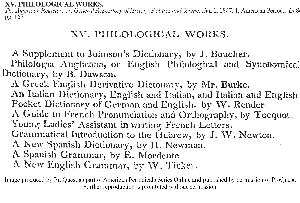 ―167b― ―167b―
XV. PHILOLOGICAL WORKS.
A Supplement to Johnson's Dictionary, by J. Boucher.
Philologia Anglicana, or English Philological and Synonomical
Dictionary, by B. Dawson.
A Greek English Derivative Dictonary, by Mr. Burke.
An Italian Dictionary, English and Italian, and Italian and English.
Pocket Dictionary of German and English, by W. Render.
A Guide to French Pronunciation and Orthography, by Tocquot.
Young Ladies' Assistant in writing French Letters.
Grammatical Introduction to the Hebrew, by J. W. Newton.
A New Spanish Dictionary, by H. Newman.
A Spanish Grammar, by E. Mordente
A New English Grammar, by W. Ticker.
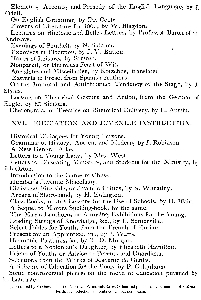 ―168a― ―168a―
Elements, Accents, and Prosody of the English Language, by J.
Odell.
On English Grammar, by Dr. Coote.
Flowers of Literature for 1805, by W. Blagdon.
Lectures on Rhetoric and Belles Lettres, by Professor Baron of St.
Andrews.
Evenings of Southell, by N. Salmon.
Exercises in Elocution, by J. V. Button.
Hours of Leisure, by Brewer.
Nonpareil, or Harmless Feast of Wit.
Anecdotes and Miscellanies, by Kotzebue, translated.
Extracts in Prose, from Spanish Authors.
On the Immoral and Antichristian Tendency of the Stage, by J.
Styles.
Lessons on Theatrical Gesture and Action, from the German of
Engle, by H. Siddons.
Cheronomia, or Treatise on Rhetorical Delivery, by C. Austin.
XVI. EDUCATION AND JUVENILE INSTRUCTION.
Historical Dialogues for Young Persons.
Grammar of History, Ancient and Modern, by J. Robinson.
A New General Atlas.
Letters to a Young Lady, by Mrs. West.
Letters to Dissenting Ministers, and Students for the Ministry, by
Job Orton.
Introduction to the Game of Chess.
Humber's Juvenile Miscellany.
Christmas Fire-side, or Juvenile Critics, by S. Wheatley.
Arcana of Short-hand, by H. Ewington.
Class Books, or 365 Lessons for the Use of Schools, by D. Blair.
A Sequel to Mavors Spelling-book, by the same.
The Magic Lanthorn, or Amusing Exhibitions for the Young.
Leading Strings of Knowledge, &c., by E. Somerville.
Select Fables for Youth, from the French of Florian.
Present for an Apprentice, &c., by J. Watts.
Harmonic Pastimes, &c. by T. D. Morgan.
Letters to a Nobleman's Daughter, by Elizabeth Hamilton.
Friend of Youth, or Advice to Parents and Guardians.
Selections from the Works of Madame de Genlis.
A Scheme of Education for the Poor, by P. Colquhoun
Some controversial pieces, on the mode of education pursued by
L. Lancaster.
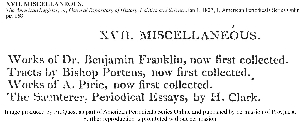 ―168b― ―168b―
XVII. MISCELLANEOUS.
Works of Dr. Benjamin Franklin, now first collected.
Tracts by Bishop Porteus, now first collected.
Works of A. Pirie, now first collected.
The Saunterer, Periodical Essays, by H. Clark.
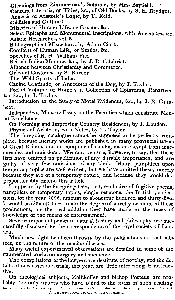 ―169― ―169―
Cleanings from Zimmerman's Solitude, by Mrs. Bayfield.
Censura Literaria, or Titles, &c., of Old Books, by S. E. Brydges.
Analysis of Aristotle's Logic, by T. Reid.
Oddities and Outlines.
Miseries of Human Life, or Groans, &c.
Select Epitaphs and Monumental Inscriptions, with Anecdotes, &c.
Asiatic Researches, vol. 8.
Bibliographical Miscellany, by Adam Clark.
Comforts of Human Life, or Smiles, &c.
Speeches of R. H. William Pitt.
British Indian Monitor, &c., by J. B. Gilchrist.
Alliance between Christianity and Commerce.
Oriental Customs, by S. Burder.
The Wild Sports of India.
Canine Gratitude, or Anecdotes of the Dog, by J. Taylor.
Pocket Volume of Homer, a Collection of Epigrams, Repartees,
&c. &c., by J. Taylor.
Introduction to the Study of Moral Evidences, &c., by J. E. Gum-
beer.
Independent Man, or Essay on the Faculties which constitute Men-
tal Excellence.
On Forming and Improving Country Residences, by J. Loudon.
Physics of Aristotle, with Notes, by T. Taylor.
The foregoing catalogue cannot be supposed to be perfectly com-
plete, because literary works are published in many provincial towns
of Great Britain, and no compiler of catalogues is exempt from inac-
curacies and omissions. We may venture, however, to say, that these
lists have omitted no publication of any durable importance, and are
guilty of very few omissions of any kind. Many pamphlets upon
temporary topics are well written, but we have omitted these, merely
because they are of a temporary nature, and because they would dis-
proportionably extend this article.
It appears by the foregoing lists, that, exclusive of fugitive poems,
pamphlets on temporary topics, single sermons, the British publica-
tions, for the year 1806, amount to about four hundred and thirty-five.
It would be difficult to estimate the degree of novelty or value of these
productions, or the real addition they have made to the mass of
knowledge or the means of entertainment.
Several important points in natural history and philosophy are suc-
cessfully discussed by the correspondents of the royal society of Lon-
don.
Much new light has been thrown, by the publications on that sub-
ject, on the nature of the vaccine disease.
Many useful experimental observations are detailed in some of the
enumerated works on surgery and medicine.
The compilations of the lawyers are destitute of novelty, and the de-
tails of new cases and trials, this year, are little interesting or instruc-
tive.
On theological subjects, Zollikoffer and bishop Porteus are pro-
bably the only writers who have added to the mass of such reading
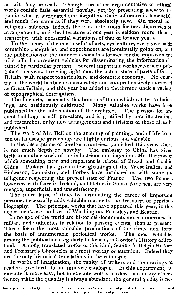 ―170― ―170―
as will long be read. Though the other argumentative or ethical
works contain little essential novelty, yet, by presenting anew to the
public what is antiquated and forgotten, their influence is beneficial,
and much the same as if they were absolutely new. On moral and
religious subjects, indeed, there is little room for new dicoveries or
arrangements, and the literature of one year is seldom more than a
transcript, with unessential variations, of that of former years.
To the theory of the most useful of arts, agriculture, every year adds
something; enquiries and experiments are continually going on, and
the publications of the numerous societies formed for the improvement
of it afford convenient vehicles for disseminating the information ob-
tained by particular persons. Several important works have been pub-
lished this year, throwing light upon the actual state of parts of Great
Britain, with respect to agriculture and domestic economy. No coun-
try in the world has been so accurately and comprehensively surveyed
as Great Britain, and this year has added to the former stock a variety
of topographical descriptions.
The fine arts, especially that branch of them which relates to build-
ings, are assiduously cultivated. Many valuable works have been
published for the information of the architect. The passion for an-
cient buildings is still prevalent, and is gratified by new illustrations
and researches, or by new arrangements and divisions of those already
published.
The work of Mr. Bell on the anatomy of painting, and of Mr Rep-
ton on landscape gardening, are highly curious and valuable.
In the descriptions of foreign countries, published this year, there
is not much depth or novelty. The embassy to China has given
birth to another work of the industrious and ingenious Mr. Barrow, in
which something new and important is related of Brazil and Cochin
China. Pinkard has given a few gleanings of the West Indies, and
Pinkerton, Lemaistre, and Forbes have furnished us with some in-
telligence respecting the present state of France. The two former,
however, with Carr in Ireland, and Helms in South America, are very
meagre, superficial, and unsatisfactory.
The mere lapse of time, by terminating the career of important
persons, necessarily adds valuable matter to the treasures of previous
biography. The principal works that have appeared this year, in this
department, are the lives of Washington, Priestley, and Beattie.
In no age of the world are historical documents more numerous, fa-
miliar, and authentic, in relation to passing events, than at present.
These form the most valuable productions of the time, and form
the basis of innumerable periodical works. The most valuable,
among the publications regularly historical, is Gordon's History of Ire-
land. Among translated works of this kind, Schiller's Belgic History
and Froissart's Chronicles are most worthy of attention. Indeed they
are the only historical translations in the catalogue.
In works of imagination, the vanity of writers and the cravings of
readers give birth to an immense catalogue. In this department, to
execute is more easy, but to execute well is harder, than in any other:
hence, while the quantity is always abundant, the general quality is ne-
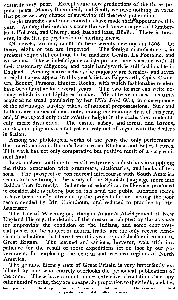 ―171― ―171―
cessarily very poor. Except some new productions of the three po-
pular poets, Moore, Bloomfield, and Scott, we have nothing in verse
that possesses any chance of surviving till the next generation.
Eight tragedies and nine comedies have made their appearance this
year. Among their authors occur the well known names of Cumber-
land, Holcroft, and Cherry, and, last and least, Dibdin. There is, how-
ever, in the list, no production of sterling merit.
Of novels, we may count up near seventy new ones in 1806. Of
these, eight or ten are imported. The foreign manufacturers, in
greatest vogue still continue to be madame Genlis, La Fontaine, and
Kotzebue. These indefatigable artists pursue their vocation with all
their customary diligence, and their handywork is still fashionable in
England. Among native artists, the majority are females, and seven
or eight names appear in this year's list, as Edgeworth, Opie, Owen-
son, Bennet, Parsons, Hunter, Roche, with which fashionable readers
have been familiar for several years. The two former can write no-
thing which is not highly estimable. Miss Owenson has, this time,
acquired no small popularity by her Wild Irish Girl, in consequence
of the advantage, adroitly taken, of national prepossessions. Surr and
Latham are names of most note, among the man-novelists of this year,
and, if we regard only their relative height in the scale, they undoubt-
edly merit distinction. The castle, abbey, and forest, and barons,
monks, and pilgrims are not yet entirely out of vogue with the dealers
in fiction.
Among the philological works of the year, the only performance
that merits notice is Baron's Lectures on Rhetoric and Belles Lettres.
This work has not only comparative but positive merit of a very emi-
nent kind.
Book-makers continue to be still extremely industrious in supplying
the rising generation with grammars, dictionaries, and books of les-
sons. The prospect of commercial intercourse with South America
seems to have brought the study of the Spanish language more into
fashion than formerly. Schemes of education are likewise produced
in considerable numbers, but on this head the public attention seems
to have been chiefly attracted by the projects for instructing the poor
recommended by Mr. Colquhoun, and reduced to practice by Mr.
Lancaster.
The Life of Washington, Hannah Adams's Abridgement of New
England History, the details of the measures adopted by the Friends
for improving the condition of the Indians, and some controver-
sial pieces on the subject of neutral trade, are the only recent Ame-
rican productions that have been this year republished or circulated in
Great Britain. The learned and curious, however, wait with im-
patience for the result of those expeditions set on foot by our go-
vernment, for exploring the central and western regions of North
America.
The genuine literary state of Great Britain is very imperfectly ex-
hibited by one who entirely overlooks the periodical publications of
the time. These have a much more extensive circulation than any
other kind of works; they are cheaper in proportion to their bulk, and, be-
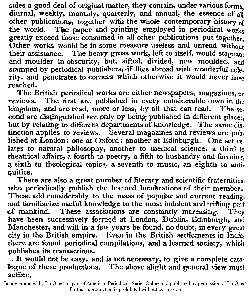 ―172― ―172―
sides a good deal of original matter, they contain, under various forms,
diurnal, weekly, monthly, quarterly, and annual, the essence of all
other publications, together with the whole contemporary history of
the world. The paper and printing employed in periodical works
greatly exceed those consumed in all other publications put together.
Other works would be in some measure useless and unread without
their assistance. The heavy gross work, left to itself, would stagnate
and moulder in obscurity, but, sifted, divided, new moulded, and
stamped by periodical publishers, if flies abroad with wonderful cele-
rity, and penetrates to corners which otherwise it would never have
reached.
The British periodical works are either newspapers, magazines, or
reviews. The first are published in every considerable town in the
kingdom, and are read, more or less, by all that can read. The se-
cond are distinguished not only by being published in different places,
but by relating to different departments of knowledge. The same dis-
tinction applies to reviews. Several magazines and reviews are pub-
lished at London: one at Oxford: another at Edinburgh. One set re-
lates to natural philosophy, another to medical science, a third to
theatrical affairs, a fourth to poetry, a fifth to husbandry and farming,
a sixth to theological topics, a seventh to music, an eighth to anti-
quities.
There are also a great number of literary and scientific fraternities,
who periodically publish the learned lucubrations of their members.
These add considerably to the mass of popular and current reading,
and familiarize useful knowledge to the most indolent and trifling part
of mankind. These associations are constantly increasing. They
have been successively formed at London, Dublin, Edinburgh, and
Manchester, and will in a few years be found, no doubt, in every great
city in the British empire. Even in the British settlements in India,
there are found periodical compilations, and a learned society, which
publishes its transactions.
It would not be easy, and is not necessary, to give a complete cata-
logue of these productions. The above slight and general view must
suffice.
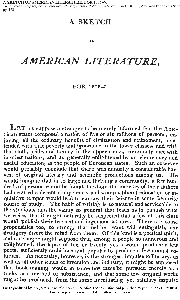 ―173― ―173―
A SKETCH
OF
AMERICAN LITERATURE,
FOR 1806-7.
LET us suppose a stranger to be merely informed that the Ame-
rican states composed a nation of five or six millions of persons, en-
joying all the ordinary benefits of civilization and refinement, unat-
tended with that poverty and ignorance in the lower classes, and with
that sloth, pride, and luxury in the upper ranks, commonly met with
in other nations, and as generally enlightened by an elementary and
useful education, as the people of European states. Such an observer
would probably conclude that there was annually a considerable har-
vest of original literary and scientific productions among us. He
would imagine that in so large and thriving a community, a few hun-
dreds of persons would be found, to whom the industry of their fathers
had secured a decent competence, and whom a liberal education or in-
quisitive temper would lead to employ their leisure in some favourite
course of study. The habit of writing is so natural and serviceable to
the studious, and the vanity so general that leads us to publish what
we write, that it might naturally be suspected that a few of this class
would publish their learned and ingenious labours. There are some
propensities too, so strong, that neither want will extinguish, nor
drudgery divert the mind from them. Of this kind is a poetical spirit,
and a stranger might suppose that, among a people so numerous and
enlightened, the lapse of ten or twenty years would produce a few
poets, sufficiently ambitious and popular to produce a few annual vo-
lumes. As necessity, however, is the strongest impulse to literary, as
well as all other kinds of invention and industry, it might be supposed
that book-making would in some few cases be pursued merely as a
trade, as a method of subsistence, and that some few original works
might be produced, from the same humiliating yet salutary impulse
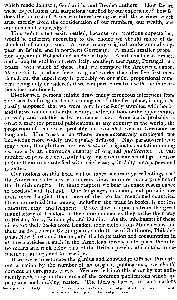 ―174― ―174―
which made Johnson, Goldsmith, and Dryden authors. How far are
these expectations and suspicions justified by our experience? how far
does the harvest of American literature agree with those views which
arise merely from the consideration of our numbers, our wealth, and
our means of knowledge?
This point is not easily settled, because our previous expectations
would be different, according to the choice we should make of the
standard of comparison. A great many original works annually ap-
pear in Britain and in northern Germany. A much smaller propor-
tion appears in Holland and northern Italy. A still smaller in France,
and a smaller still in southern Italy, southern Germany, Portugal, and
Spain: with which of these shall we compare the American nation.
We certainly produce fewer original works than the five first men-
tioned, but the superiority is probably on our side, proportional num-
bers being duly considered, if we compare ourselves with the four na-
tions last mentioned.
Ill-informed persons might draw many erroneous inferences from
the scarcity of original books among us. In the first place, it might be
hastily supposed that we were very imperfectly supplied with books,
and that we wanted either the faculty, the inclination, or the opportunities
to read; and yet this is by no means true. America is probably as
great a mart for printed publications as any country in the world; the
proportion of readers is probably not exceeded even in Germany or
England. The press is no where more extensively employed, nor
knowledge more widely and equably diffused. Nay, paradoxical as it
may seem, though there are few books of original speculation among
us, there is an enormous quantity of original publication. A vast
number of pens are constantly busy, but circumstances oblige them or
incline them to be satisfied with brief essays, in daily newspapers and
gazettes.
Our notions on this head will be more accurate by reflecting, that
the American states are, in a literary view, no more than a province of
the British empire. In these respects we bear an exact resemblance
to Scotland and Ireland. Our language, manners, and pursuits are
even more English than those of the two last mentioned countries.
Our commercial intercourse, including the trade in books, is not less
extensive, easy, and frequent. Books flow in upon us from the great
manufactory of London, in the same manner as they make their way
to Bristol, York, Edinburgh, and Dublin. As the inhabitants of these
cities get their books from London, their cloths from Manchester, and
their hardware from Birmingham, so do those of Baltimore, Philadel-
phia, New York, and Boston, and the importation and consumption in
all these articles is such in the American towns, as to place them by
no means in a rank below that of the British provincial capitals, in re-
finement, luxury, and knowledge.
If we were to estimate the genius and knowledge diffused through-
out a nation by the number of its original publications, we should
commit an egregious error. We are led into this error by not suffi-
ciently reflecting on the nature of the common publications which ap-
pear in a book-making nation. The literary harvest in such nations
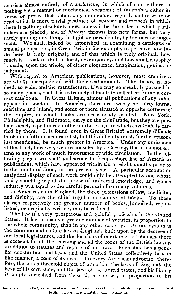 ―175― ―175―
consists almost entirely of translations, in which of course there is
nothing but a manual or mechanical vocation; of inventions either in
verse, or prose, that obtain only momentary regard, and to write or
read which is mere trivial pastime; of systems and methods in which
there is nothing absolutely new, unless it be the order in which parti-
culars are placed; and of history thrown into new forms, but very
rarely gaining any thing, in light or perspicuity, by the new arrange-
ment. We shall indeed be astonished, in examining a catalogue of
annual publications, in Great Britain for example, to perceive how lit-
tle there is truly original; and of that which is truly original, how
much is trivial, or dull, or local, or temporary, and how small a display
is made, upon the whole, of either eloquence, imagination, genius, or
judgment.
With regard to American publications, however, most enquirers
are wholly unacquainted with their real amount. The theatre is, in-
deed, so wide, and the manufacture, if we may so speak, is pursued in
so many places, that it is extremely difficult to collect or frame a cor-
rect catalogue. In Great Britain, almost all publications of any value
appear in London. In America, there are twenty or thirty towns,
maritime and inland, and some of them situated at opposite corners of
the empire, in which books are occasionally printed. New York,
Philadelphia, and Baltimore, carry on the chief trade, but they are per-
haps nearly equal to each other in the extent to which this trade is car-
ried by them. It is found, even in Great Britain, extremely difficult
to obtain a full and accurate list, but this difficulty must, for the reasons
just mentioned, be much greater in America. Under any omissions
of this kind, however, we are consoled by reflecting, that it cannot ex-
tend to any work of much importance or wide circulation. In the fol-
lowing pages we shall endeavour to form a short list of American
publications, which have appeared within six or eight months prior to
to the month of June, in the present year. A particular account or
analytical display of each work could only be attempted by one whose
vanity should grasp at the praise of universal knowledge, and whose
industry was equal to the careful perusal of so many volumes.
In America, as in England, the three professions of law, medicine,
and divinity, are the chief regular consumers of books. To these
classes respectively the greater number of books, imported, repub-
lished, or originally written, may be reduced.
The law is a very prosperous and gainful profession in the United
States. It has probably a greater number of votaries, in proportion to
the whole community, than in any other country. As our system is
the common and statute law of England, built upon by the decrees of
our local legislatures, and the decisions of our domestic tribunals, there
is occasion for all the learning and all the books of the British lawyer,
in addition to statutes and reports of our own. Each state has a pecu-
liar constitution and laws, and the United States collectively has, in
like manner, a code of its own. To every American advocate, there-
fore, there is a threefold object of attention, the laws of England, the
laws of his own state, and the laws of the United States, and his library
is amply furnished from these three sources, in proportion to his
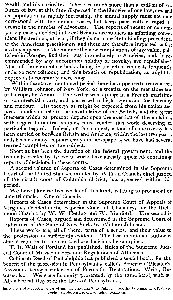 ―176― ―176―
wealth and his curiosity. There is much more than a million of vo-
lumes of law, at this time dispersed in the libraries of our lawyers, and
as population is rapidly increasing, the annual supply must not only
correspond with the annual waste, but keep pace with a rapid in-
crease in the number of advocates. The reports of recent or contem-
porary cases, decided in Great Britain, are studied, as affording conve-
nient illustrations, at least, if they do not constitute binding precedents
to the American practitioner, and these are therefore imported as fast
as they appear. In like manner the new compilations of any value, pub-
lished in Europe, find their way immediately to America, and, if re-
commended by any uncommon solidity or novelty, are republished.
Most of the elementary books being in perpetual request, frequently
undergo new editions; and this branch of republication, as might be
expected, is constantly increasing.
Within the above-mentioned period there has appeared a translation,
by William Johnson, of New York, of a treatise on the maritime law
of Europe, by Azuni. The writer was a judge in a French maritime
or commercial court, and possessed a high reputation for learning
and candour. His theory, as might be expected from his nation and
post, is unfavourable to the naval claims of the British, and the great
interests which at present depend upon the exertion of these claims,
with regard to neutral nations, must render this work deserving of
particular regard. Indeed, on this subject, a kind of controversy has
been carried on between Britain and America, within the last two years,
and, besides many copious essays in newspapers, we have had several
learned pamphlets on the subject.
Short as has been the duration of the federal government, and the
tribunals created by it, several works have already appeared, containing
reports of decisions in these courts.
A second volume of Reports of Cases determined in the Supreme
Court of the United States, compiled by William Cranch, chief justice
of the circuit court of Columbia district, has appeared within this
period.
We have likewise two works of this kind, relating to provincial or
state tribunals. One of these is
Reports of Cases determined in the Supreme Court of Appeals
of Virginia, decided in the Superior Court of Chancery, for the Rich-
mond District, by W. W. Hening and W. Munford. The second is
Reports of Cases, argued and determined in the Supreme Court of
Judicature of the State of New York, by William Johnson.
These works are, all of them, parts of a series, and their value to
the profession is sufficiently evident. The last mentioned author is
official reporter to the court, whose decisions he compiles.
T. B. Wait of Portland has published, Rules of the Supreme Judi-
cial Court of Massachusetts, and Regulations of Attornies.
Collinson Reed of Philadelphia has published a useful book, for the
benefit of the profession in Pennsylvania, called, American Pleader's
Assistant, being a collection of Forms for Declarations, Writs, Re-
turns, &c. We were formerly presented, by the same hand, with an
Alphabetical Digest of the Laws of Pennsylvania.
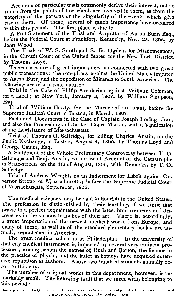 ―177― ―177―
Accounts of particular trials commonly derive their interest, not so
much from the points of law which are involved in them, as from the
notoriety of the persons or the singularity of the events which give
rise to them. Of these, several of much importance have occurred
within this period. The first place is due to
A Full Statement of the Trial and Acquittal of Aaron Burr, Esq.,
before the Federal Court at Frankfort, Kentucky, Nov. 25, 1806, by
John Wood.
The Trials of W. S. Smith and S. G. Ogden, for Misdemeanors,
in the Circuit Court of the United States for the New York District,
by Thomas Loyd.
These cases are of great importance, as connected with two great
public transactions: the conspiracy against the United States, imputed
to Aaron Burr, and the expedition of Miranda to South America. The
following are of a private nature:
Trial in the Case of Philip Arcularius against William Coleman,
for a Libel; at New York, January 3, 1807, by William Sampson,
Esq.
Trial of William Hardy, for the Murder of an Infant, before the
Supreme Judicial Court at Boston, in March, 1807.
Facts and Documents in the Case of Captain Joseph Loring, Jun.,
and also the Proceedings of the last Court Martial, with a Vindication
of the Legislature of Massachusetts.
Trial of Thomas O. Selfridge, for killing Charles Austin, on the
Public Exchange, at Boston, August 4, 1806, by Thomas Loyd and
George Caines, Esq.
A Statement of the Whole Preliminary Controversy between T. O.
Selfridge and Benj. Austin, with a Brief Account of the Catastrophe
in State-street, on the 4th of August, 1806, with Remarks, by T. O.
Selfridge.
Trial of Andrew Wright, on an Indictment for Libels against Go-
vernor Strong of Massachusetts; before the Supreme Judicial Court
of Massachusetts, September, 1806.
The medical sciences may be said to flourish in the United States.
The profession is distinguished by their learning, if we limit that
praise to a perfect acquaintance with the latest improvements and dis-
coveries in the various branches of their art. There is, accordingly,
a great importation of the newest medical works from Europe, and
many of these, as well as of the standard elementary books, are an-
nually republished in America.
The great medical school is at Philadelphia. In the university of
that city medical instruction is imparted by several very eminent pro-
fessors; among whom the names of Rush and Barton, the former in
the practice of physic, and the latter in botany, have acquired exten-
sive reputation as authors. Above two hundred students annually re-
sort to this city.
The number of original works in this department, however, is re-
markably small. The following is all that we meet with, belonging to
this period:
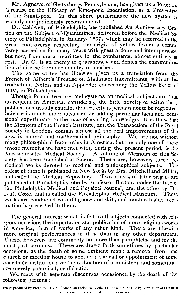 ―178― ―178―
Mr. Agnews, of Gettysburg, Pennsylvania, has given us a Practical
Treatise on the Efficacy of Kine-pock Inoculation, as a Preventive
of the Small-pox. In this short performance the new system is
warmly and judiciously recommended.
Dr. Caldwell, of Philadelphia, has published An Anniversary Ora-
tion on the Subject of Quarantines, delivered before the Medical So-
ciety of Philadelphia, in January, 1807, which may be referred to the
great controversy respecting the origin of yellow fever: a contro-
versy carried on for many years with great ardour and intemperance,
but now, from mere weariness in the combatants, almost entirely at
rest. Dr. C. is an enemy to quarantines, and denies the communica-
tion of disease from one country to another.
The same writer has likewise given us a translation from the
French of Alibert's Treatise on Malignant Intermittents, with an In-
troduction, Notes, and an Appendix concerning the Yellow Fever of
1805, in Philadelphia.
Though formal treatises and systems on medical subjects are thus
unfrequent in America, considering the little novelty or value these
publications usually contain, this scarcity is perhaps not to be regretted.
Science is much more advanced by adding particular facts and occa-
sional experiments to the mass of existing knowledge. It is thus, that
the Memoirs of the French Institute, and the Transactions of the Royal
Society in London, contain almost all the real improvements of the
age, in natural and mathematical philosophy. We are not without
many philosophical fraternities in America, but the only one of these
whose memoirs we have met with, during the present period, is the
Massachusetts Medical Society. A volume of Memoirs of this So-
ciety has been published at Salem. There are, however, three pe-
riodical works devoted to medical and philosophical subjects. The
oldest of these is published at New York, by Drs. Mitchell and Millar,
and called the Medical Repository. Two others, of later origin, are
published at Philadelphia, one by professor Barton, under the title of
the Philadelphia Medical and Physical Journal, and the other by Dr.-
J. R. Coxe, and is called the Philadelphia Medical Museum. These
works are conducted with diligence and skill, and much valuable infor-
mation is preserved in them.
The general interest which is felt in all subjects connected with reli-
gion, occasions the importation and publication of more religious works
in America, than of works of any other kind. There are likewise
more original performances in this, than in any other department.
These, however, are commonly no more than pamphlets, and for the
most part sermons. These are drawn forth sometimes by particular
occasions, as the death of some eminent man; a removal from one
church or meeting house to another; the call or appointment of some
charitable institution; or the ordination of a minister; and sometimes
are merely polemical, or didactic.
We meet with separate discourses occasioned by the death of the
following persons:
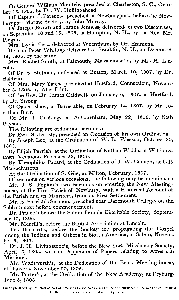 ―179― ―179―
Of General William Moultrie, preached at Charleston, S. C., Octo-
ber 15, 1805, by Dr. W. Hollingshead.
Of Captain J. Parsons, preached at Newburyport, before the New-
buryport Marine Society, by John Murray.
Of Joseph Brown and James Jenness, delivered, in two Discourses,
on September 10 and 15, 1806, at Hampton, N. H., by the Rev. Mr.
Pidgin.
Mrs. Lydia Fisk, delivered at Wrentham, by Dr. Emmons.
Deacon Peter Whiting, delivered at Franklin, N. H., on December
15, 1806, by the same.
Mrs. Rachel Smith, at Falmouth, Massachusetts, by Mr. H. Lin-
coln.
Of Dr. S. Stillman, delivered at Boston, March 10, 1807, by Dr.
Baldwin.
Of Mrs. Mary Yates, preached at Hartford, Connecticut, Novem-
ber 3, 1806, by Abel Flint.
Of the Rev. Dr. James Caldwell, on January 6, 1807, at Hartford,
by Dr. Strong.
Of Oakes Shaw, at Barnstable, on February 14, 1807, by Mr. Jo-
nathan Burr.
Of Mr. J. Cushing, at Ashburnham, May 22, 1806, by Seth
Payson.
The following are ordination sermons:
By Ezra Styles Ely, preached on Occasion of his own Ordination.
By Joseph Lee, at the Ordination of W. B. Wesson, October 30,
1803.
By Elijah Parrish, at the Ordination of Nathan Waldo, at Williams-
town, Vermont, February 26, 1806.
By Theophilus Pacard, at the Ordination of J. W. Cannon, at Gill,
Massachusetts.
At the Ordination of S. Gile, at Milton, February, 1807.
Of sermons on various occasions, the following may be mentioned:
Mr. J. S. Popkin's two Sermons on entering the New Meeting-
house, at the First Parish of Newbury, with a Historical Account of
the Parish and its Ministers, from its First Settlement.
Mr. E. Parrish's Sermon, preached near Dartmouth College, on the
Sabbath next before commencement.
Dr. Prince's before the Salem Female Charitable Society, Septem-
ber 17, 1806.
Mr. Merrill's, before the Baptist Association at Lincoln.
Dr. Barnard's, before the Society for propagating the Gospel
among the Indians and Others in North America, at Salem, Novem-
ber 6, 1806.
Dr. J. H. Livingstone's, before the New York Missionary Society,
April 3, 1804, with an Appendix of Papers relating to American
Missions.
Mr. Wadsworth's, at the Dedication of the Brick Meeting-house,
at Danvers, November 20, 1806.
Mr. Porter's, at the Dedication of the New Academy, at Fryburg,
June 4, 1806.
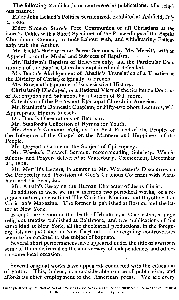 ―180― ―180―
The following are didactic or controversial publications, of a religi-
ous nature:
Elder John Leland's Politics Sermonized, exhibited at Ashfield, July
4, 1806.
Elder Simeon Stove's Free Communion of all Christians at the
Lord's Table, with a Short Specimen of the Proceedings of the Baptist
Church and Council, in their Labour with, and withdrawing Fellow-
ship with the Author.
Mr. Field's Strictures on Seven Sermons, by Mr. Merrill, with an
Appendix, on the Modes and Subjects of Baptism.
Mr. Baldwin's Baptism of Believers only, and the Particular Com-
munion of the Baptist Churches explained and defended.
Mr. Booth's Abridgement of Abadie's Translation of a Treatise on
the Divinity of Christ, originally in French.
Mr. Rowland's Epitome of Ecclesiastical History.
Christianity Displayed, or a Rational View of the Scripture Doctrine
of Redemption and Salvation, by a Citizen of Baltimore.
Catechism of the Protestant Episcopal Church in America.
Mr. Stanford's Domestic Chaplain, or Fifty-two Short Lectures, with
Appropriate Hymns to each.
Dr. Dana's Observations on Baptism.
Mr. Stanford's Collection of Hymns for Youth.
Mr. Bonar's Genuine Religion the Best Friend of the People, or
the Influence of the Gospel on the Manners and Happiness of the
People.
Mr. Osgood's Letter on the Subject of Episcopacy.
Mr. Weeks's Farewell Sermon, recommending Sobriety, Watch-
fulness, and Prayer, delivered at Waterbury, Connecticut, December
21, 1806.
Mr. Merrill's Letters, in answer to Mr. Worcester's Discourses on
the Perpetuity and Provision of God's Gracious Covenant with Abra-
ham and his Seed, &c.
Mr. Austin's Essay on the Human Character of Jesus Christ.
In addition to these we must mention two periodical works, of a re-
ligious nature, one entitled The Christian Monitor, and the other The
Christian's Magazine. The former is published at Boston, and the lat-
ter at New York.
Except the sermon on the death of Moultrie, at Charleston, a single
religious treatise published at Baltimore, and five publications of the
same kind at New York, all the theological productions, in the forego-
ing list, are published in New England. The reigning controversies
seem to be confined to the subject of baptism.
Several short performances have appeared under the title of orations,
some of them delivered on the anniversary of independence, and others
on some local occasion.
Several original works have appeared, connected with the education
of youth. This, indeed, is a considerable source of publication, and
affords its chief employment to the American press. We are every
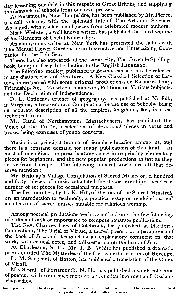 ―181― ―181―
day lessening our debt in this respect to Great Britain, and supplying
the demands of schools from our own presses.
At Portsmouth, New Hampshire, has been published by Mr. Pierce,
a small volume, with the splendid title of The Arts and Sciences
Abridged, with a selection of pieces from celebrated modern authors.
Noah Webster, a well known writer, has published the third volume
of his Elements of Useful Knowledge.
An anonymous writer at New York has presented the ladies with
The Mental Flower Garden, or an Instructive and Entertaining Com-
panion for the Fair Sex.
There has also appeared, at the same city, The Juvenile Spelling-
book, being an Easy Introduction to the English Language.
The following medley, published at Boston, can scarcely be referred
to any distinct class of literature. A New Classical Selection of Let-
ters, interspersed with some original productions, on Business, Duty,
Friendship, &c. To which is annexed, Petitions on Various Subjects,
and the Declaration of Independence.
D. L. Cotineau, teacher of geography, has published at Norfolk,
in Virginia, a Geographical Compilation for the use of Schools, being
an accurate description of all the empires, kingdoms, &c., in a ca-
techetical form.
Mr. Rand of Northampton, Massachusetts, has published the
Voice of the Turtle, a selection of devotional pieces in verse and
prose, being exercises of young converts.
Music is a principal branch of female education among us, and
there is a constant demand for many publications of this kind. In
most of our cities, the press is always busy in re-printing elementary
pieces for beginners, and the new popular productions as fast as they
arrive from Europe. The following musical works are all that de-
serve mention:
Mr. Belknap's Village Compilation of Sacred Music, or, a hundred
and forty pieces of music calculated for divine worship; besides a
number of set pieces for occasional purposes.
The first number, by U. K. Hill, of Boston, of the Sacred Minstrel,
or, an introduction to psalmody, a practical essay on modulation, and
a collecton of sacred music, suitable for religious worship.
Among poetical productions we have noticed only the few following,
of sufficient bulk or importance to compose separate publications.
The Rev. Chancey Lee, of Colebrook, has published at Hartford,
Connecticut, The Trial of Virtue, a sacred poem; or a paraphrase of
the book of Job, and designed as an explanatory comment on that
work, with critical notes, and a dissertation on the book of Job.
At Charleston, S. C., Mr. J. B. White has published a dramatic
poem, entitled The Mysteries of the Castle, or the Victims of Revenge.
L. M. Sargeant, of Boston, has published a translation of the Culex
of Virgil.
Mr. Sewal, of Portsmouth, N. H., has published a small collection
of poems, with some specimens of a reduction into metre of Ossian's
rhapsodies.
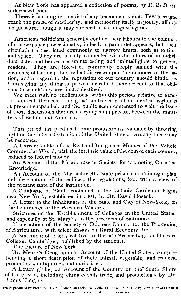 ―182― ―182―
At New York has appeared a collection of poems, by R. B. Davis,
a deceased poet.
There is nothing in this list of any permanent value. Few passages
reach the praise of mediocrity, and mediocrity itself, in poetry, affords
no pleasure, though it may succeed in not disgusting us.
American politicians generally confine their labours to the columns
of a newspaper; occasionally, indeed, a pamphlet appears, but their
circulation is restricted commonly to narrow limits, both as to time
and space. They are usually connected with the affairs of an indivi-
dual state, and hence are uninteresting and unintelligible to general
readers. They are, likewise, commonly deeply stained with the
virulence of faction; they reflect disgrace upon the manners of the na-
tion, and a regard to the reputation of our country should hinder us
from saying any thing to prevent or retard their descent to that obli-
vion to which they are finally destined.
We meet with no publications, within this period, relative to gene-
ral political theories; the great controversy about neutral rights is
at present suspended, and the public seem contented to wait the issue
of those discussions that are carrying on in private, between the minis-
ters of Britain and America.
This period has produced some productions, valuable by throwing
light on the internal situation of the United States. Among these may
be reckoned
A Correct Table of the Real and Imaginary Monies of the Whole
Commercial World, with the intrinsic value of the coin of each country,
reduced to federal money.
An Account of the Massachusetts Society for promoting Christian
Knowledge.
An Account of the Massachusetts State-prison: containing a plan
and description of the edifice; the regulations, &c., with a view of
the present state of the institution.
A Catalogue of Plants contained in the Botanic Garden at Elgin,
near New York, established in 1801, by Dr. David Hosack.
A Letter to the Inhabitants of the State and City of New-York, on
the Commerce of the Western Waters.
Strictures on the Establishment of Colleges in the United States,
and especially of St. Mary's, in the precincts of Baltimore.
Transactions of the Society of Duchess County for the Promotion
of Agriculture, with select Essays on Rural Economy, &c.
A Statement of Facts, relative to the late Proceedings in Harvard
College, Cambridge; published by the students.
The Picture of New York.
Dr. Mease's Geographical Account of the United States, compre-
hending a short description of their animal, vegetable, and mineral
productions, antiquities, and curiosities.
A Letter giving an Account of the Country on the South Shore
of Lake Erie, including climate, soil, trade, and productions, by Dr.
James Tongue.
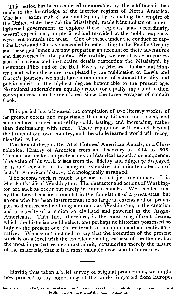 ―183― ―183―
This period has been rendered memorable, by the additions it has
made to the knowledge of the interior regions of North America.
The late treaties with France and Spain, by extending the empire of
the United States beyond the Missisippi, made it incumbent on an en-
lightened government to explore these regions, and, accordingly,
several expeditions, amply fitted and provided at the public expence,
were sent towards the west. One of these, under the conduct of cap-
tains Lewis and Clarke, succeeded in penetrating to the Pacific Ocean;
and these gentlemen are now preparing an account of their adventures
and discoveries for the public. Meanwhile, we are already in posses-
sion of curious and instructive details respecting the Missisippi, by
lieutenant Pike, and of the Red River, by Messrs. Dunbar and Hun-
ter; and when these are completed by the publication of Lewis and
Clarke's journey, we shall have a monument of national liberality and
public spirit, in the highest degree honourable to the present age.
No national undertakings, equally arduous or equally important in their
consequences, can be mentioned since the three voyages of captain
Cook.
This period has witnessed the completion of two literary works, of
far greater extent and importance than any hitherto mentioned, and
such as have a merit and utility solid, lasting, and increasing, rather
than diminishing with time. Their reputation will extend beyond
the limits of our own country, and the whole learned world will recog-
nise their value.
The first of these is Dr. Abel Holmes' American Annals, or a Chro-
nological History of America, from its Discovery in 1492, to 1806.
This author makes no pretensions to historical sagacity or eloquence.
The value of his work arises from the fidelity and diligence displayed
in it, and consists in its being an extensive and minute collection of
facts in American history, chronologically arranged.
The second work is much superior to that just mentioned. It is
Marshall's Life of Washington. The character and actions of Washing-
ton are such as occur but rarely in human annals. We recollect ma-
ny that have been instrumental in the foundation of a great state, but
no one who has been instrumental to so large an extent, and on princi-
ples so disinterested and magnanimous as Washington, to the creation
and prosperity of a nation so civilized and powerful as the Anglo-
Americans. This life, therefore, is the most magnificent theme,
which the historian could select, and perhaps no historian possessed so
fully as the present one the materials of a copious and authentic nar-
rative. We are not inclined to say that the execution of the present
work is on a level with the excellence and greatness of the theme, but
the most impartial reader must admit, considering merely the nature
of the materials, that it is a most valuable accession to literature.
Having thus taken a brief survey of original productions, we might
now proceed to say something of the works imported from Europe,
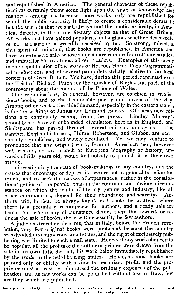 ―184― ―184―
and republished in America. The general character of these repub-
lications certainly throw some light upon the state of knowledge and
manners among us, because those works only are republished for
which the public curiosity is likely to create a considerable demand;
but the truth is that we shall always find the public curiosity, in Ame-
rica, directed to the same literary objects as that of Great Britain.
All works that have gained popularity in England, whether deservedly
or not, are sure to be greedily received by us. So strong, indeed, is
this spirit of imitation, that books are republished in America and
have an extensive sale, whose subjects are remote from all our studies,
and unintelligible to almost all our readers. Examples of this occur
in the republication of the works of Roscoe, Horne Tooke's grammati-
cal productions, and of several pamphlets strictly relative to the local
concerns of Great Britain. We have, during this period, reprinted even
the Trial of Richard Patch for the murder of Blight, and parts of the
controversy about the conduct of the Prince of Wales.
Our republications, in general, however, are confined to profes-
sional books, and to the fashionable poetry and novels of the day.
Among other works, the chief demand, especially in the eastern states,
is for the writings of Junius and Edmund Burke. Of these, new edi-
tions are continually issuing from the press. Lindley Murray's
school books have an unbounded circulation here as in England, and
Shakspeare has passed through several editions among us. The
standard English historians, Hume, Robertson, and Gibbon, are occa-
sionally republished, and widely circulated. Yet we may venture to
pronounce that any original work, from an American pen, however
well written, on any branch of European biography or history, up-
wards of fifty years old, would find nobody to publish it at their own
risque.
In investigating the state of book-making, in any country, and the
causes that encourage or depress it, we are apt in general to refine too
much, and to seek the causes of appearances, rather in the constitu-
tional genius of the people, than in the common and obvious circum-
stances on which the fruits of literary genius and industry, like all
other commodities, depend for their abundance and scarcity. Au-
thors will, in fact, be always found, and books be written, where
there is a pecuniary recompence for authors, and a ready sale for
books, but where any circumstance denies them this reward, or re-
duces the sale of books, there will necessarily be few authors.
A judicious traveller observes, that in Italy, before the French revo-
lution, very few original books were published, because the country
was divided into numerous small states, and the right of exclusively pub-
lishing was limited to each small state. Hence, if any work chanced to
be popular, all the profits of the author or printer were drawn from the
sale in his own little district, his work being immediately republished
by the trade in the neighbouring states. Hence, as most books are
printed only or chiefly with a view to pecuniary profit, and the pro-
prietor must at least be reimbursed the ordinary expences of the pub-
lication, and as few works can be published without loss in Italy, few
are they which are published.
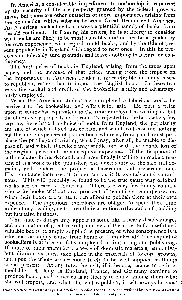 ―185― ―185―
In America, a considerable impediment to authorship is removed
by the security of literary property granted by the federal govern-
ment, but there are other obstacles of more importance, arising from
the connection which subsists between Great Britain and America.
An American bookseller has always a plentiful supply of books from
the old continent. In framing his orders, he is at liberty to consider
what books are likely to be most saleable, and in this he is guided by
his own experience, with regard to old books, and by the tide of pre-
sent popularity in England with regard to new ones. In this he pro-
ceeds on tolerably sure grounds, and leaves nothing to hazard or con-
tingency.
The high price of books in England, arising from the taxes upon
paper, and the increase of that price, arising from the impost on
the importation in America, render it more eligible in many cases,
to republish, rather than to import the English book. In these two
ways the capital and credit of the bookseller is fully and advantage-
ously employed.
When the American student has completed a laborious work, he
carries it to the bookseller, and offers it for sale. He puts a price
upon it somewhat equivalent to the time employed in writing it, but
the offer is very properly and prudently rejected by the bookseller, for,
says he, here have I a choice of books from England, the popularity
and sale of which is fixed and certain, and which will cost me nothing
but the mere expences of publication; whereas, from you I must pur-
chase the privilege of printing what I may, after all, be unable to dis-
pose of, and which therefore may saddle me with the double loss of
the original price and the subsequent expences. If the disappointed
author abates in his demand, and even finally is willing to make a pre-
sent of his work to the publisher, the uncertainty of the sale still re-
mains, and renders the project a hazardous and precarious one.
His reluctance increases in proportion as it is extensive and volumi-
nous. This will probably be found to be the true cause why original
works are so rare in America. There are very few in any country
who write books without any prospect of pecuniary recompense, or,
when their books are written, can afford to publish them at their own
expence. The ingenious, therefore, are obliged to spend their time
in desultory reading, or to turn their attention to the walks of plodding
but lucrative business.
This state of things may appear to some like a heavy disadvantage,
and as a matter of great regret; and yet, if the appetite for useful and
valuable books be amply supplied at present, of what consequence is it
whether the supply come from home or from abroad? The capital of
booksellers is at present fully employed in importing and publishing.
If more of their manufacture were of domestic materials, an equiva-
lent diminution must take place in the materials of foreign growth,
and upon the whole we are more likely to be well supplied as things
are at present. At any rate, the evil, if it be one, seems to be irre-
mediable. As long as England, France, and Germany continue to
produce books, and America is at liberty to chuse among them what
she will import, and what she will republish, it will always be most
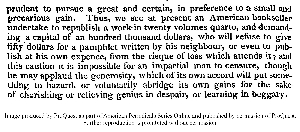 ―186― ―186―
prudent to pursue a great and certain, in preference to a small and
precarious gain. Thus, we see at present an American bookseller
undertake to republish a work in twenty volumes quarto, and demand-
ing a capital of an hundred thousand dollars, who will refuse to give
fifty dollars for a pamphlet written by his neighbour, or even to pub-
lish at his own expence, from the risque of loss which attends it; and
this caution it is impossible for an impartial man to censure, though
he may applaud the generosity, which of its own accord will put some-
thing to hazard, or voluntarily abridge its own gains for the sake
of cherishing or relieving genius in despair, or learning in beggary.
|